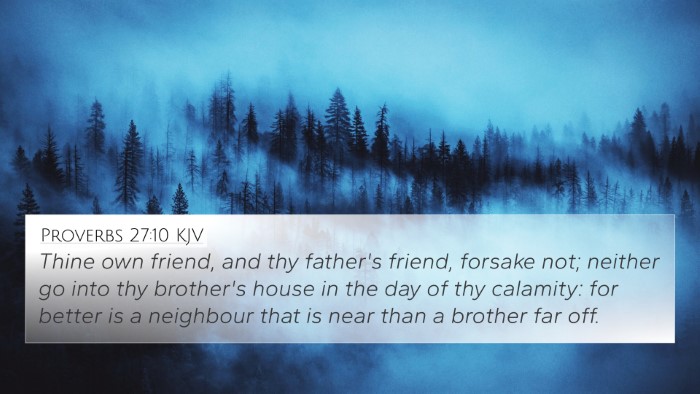Understanding Luke 10:32
Verse: "But a Samaritan, as he journeyed, came to where he was. And when he saw him, he had compassion."—Luke 10:32 (ESV)
Summary of Meaning
This verse is part of the Parable of the Good Samaritan, where Jesus illustrates the importance of compassion and kindness across social and ethnic boundaries. The character of the Samaritan, who is typically despised by the Jews, serves as a pivotal example of love and mercy in action.
Commentary Insights
-
Matthew Henry:
Henry emphasizes the unexpected nature of a Samaritan showing compassion, highlighting that true neighborliness transcends social divisions. The Samaritan's actions serve as a model of love, demonstrating that mercy is defined not by ethnicity or social standing but by the heart's willingness to help those in need.
-
Albert Barnes:
Barnes notes that the Samaritan’s actions illustrate that genuine compassion is an action, emphasizing the importance of responding to those in distress. He points out that the Samaritan does not hesitate or pass by but engages with the wounded man, showcasing the essence of love in action and calling readers to emulate this behavior.
-
Adam Clarke:
Clarke highlights the significance of the Samaritans in Jewish culture, underscoring the radical nature of Jesus’ message. He suggests that this parable serves as a challenge to the listeners' prejudices and compels them to re-evaluate their understanding of who their neighbor truly is, encouraging a broader definition of kinship based on compassion.
Bible Verse Cross-References
-
Matthew 5:7: "Blessed are the merciful, for they shall receive mercy." This verse aligns with the theme of compassion highlighted in Luke 10:32.
-
James 2:13: "For judgment is without mercy to one who has shown no mercy. Mercy triumphs over judgment." This connects well, illustrating mercy as fundamental to Christian ethics.
-
Galatians 6:2: "Bear one another’s burdens, and so fulfill the law of Christ." This reflects the active involvement shown by the Samaritan.
-
1 John 3:17: "But if anyone has the world’s goods and sees his brother in need, yet closes his heart against him, how does God’s love abide in him?" This highlights the call to act with compassion as seen in our reference verse.
-
Luke 6:36: "Be merciful, even as your Father is merciful." This encourages the reader to model their behavior after God's mercy.
-
Romans 13:10: "Love does no wrong to a neighbor; therefore love is the fulfilling of the law." This reinforces the message of love as performed by the Samaritan.
-
Proverbs 14:21: "Whoever despises his neighbor is a sinner, but blessed is he who is generous to the poor." This literary cross-reference speaks to the actions taken by the Samaritan.
Thematic Connections
This verse establishes vital thematic connections within scripture, showcasing the ongoing dialogue about love, mercy, and compassion. The Good Samaritan is an archetype of neighborly love, prompting readers to reflect upon their own responses to those in need, irrespective of societal boundaries. The narratives of mercy pervade scripture, reaffirming the call to love one's neighbor as oneself.
Comparative Bible Verse Analysis
In exploring the connections between Luke 10:32 and other scriptural passages, we uncover a rich tapestry of teachings that highlight the significance of compassion:
- Exodus 23:4-5: These verses instruct consideration for one's enemies and neighbors, representing the foundation of love and compassion that informs the Samaritan's actions.
- Matthew 22:39: "You shall love your neighbor as yourself." This commandment forms a cornerstone of ethical instruction, resonating with the message of the Good Samaritan.
Tools for Bible Cross-Referencing
Understanding and using tools for Bible cross-referencing can help deepen engagement with the text:
- Utilizing a Bible concordance to locate verses related to mercy.
- Engaging with a Bible cross-reference guide to explore thematic connections more thoroughly.
- Applying cross-reference Bible study methods to enhance understanding of interconnected scriptures.
Conclusion
Luke 10:32 serves as a profound reminder of the importance of compassion and love in the life of a believer. Drawing from both Old and New Testament teachings, this verse encourages readers to break down barriers of prejudice and adopt a lifestyle marked by mercy and kindness, thus fulfilling the heart of Jesus' teaching. By studying related verses and utilizing cross-referencing tools, individuals can gain a broader and deeper understanding of the scriptural call to love.






